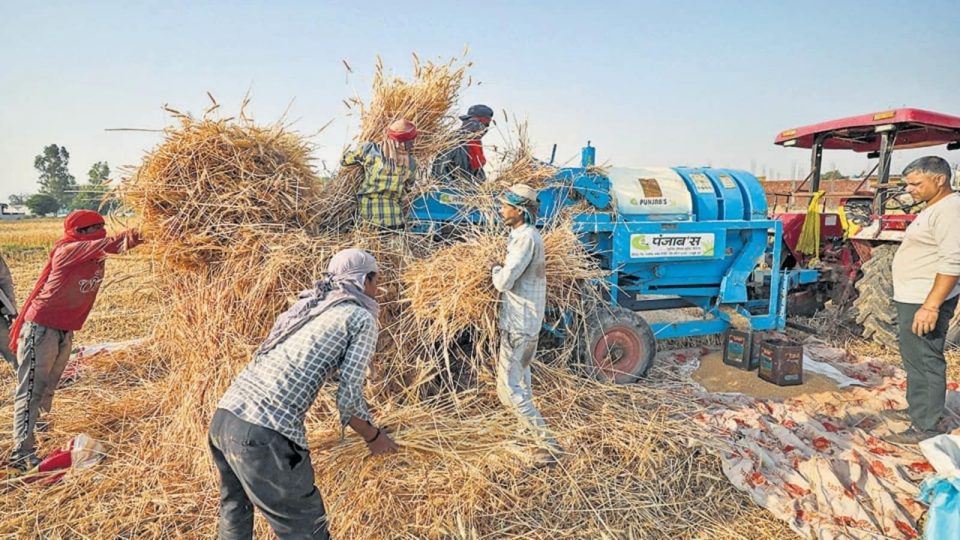India has clamped a ban on wheat exports, changing its policy of freely sending shipments around the world to plug a global food shortage sparked by the Ukraine war. The move comes on the back of a shrunken harvest after a prolonged heatwave in March, and a sharp rise in domestic food prices, especially of cereals.
{{^userSubscribed}}
{{/userSubscribed}}
India’s ban is likely to further drive up global food prices, which have risen to record levels due to a void in wheat supplies following the Black Sea conflict.
On Friday night, the directorate general of foreign trade modified the country’s wheat export policy through a notification, prohibiting all fresh wheat exports.
The notification made two exceptions. One, the Centre may allow shipments to other countries in case a direct request is received from a foreign government to “meet their food security needs”. Two, export orders that have already been finalised and for which irrevocable letters of credit have been issued will be allowed to be shipped.
India was hoping to export large quantities as the government had forecast a record output of 111 million tonne of wheat in February. A month-long heatwave from mid-March shriveled the winter staple, forcing the government to cut production estimates by at least 5.7% to 105 million tonne.
{{^userSubscribed}}
{{/userSubscribed}}
“There is a sudden spike in the global prices of wheat arising out of many factors, as a result of which the food security of India, neighbouring and other vulnerable countries is at risk,” the order banning exports said.
The curbs on exports were mainly to regulate the trade to arrest domestic food prices, three top officials said on Saturday. Wheat prices have risen to record levels, rising 19% in April compared with a year ago, which is a decadal high. Prices have soared on lower output and brisk buying by private traders at higher than the government’s minimum support price of ₹2,015 a quintal (100kg) in anticipation of robust export demand.
“The public distribution system, which is the backbone of the food security, covering almost 81.35 crore people, would be run smoothly,” food secretary Sudhanshu Pandey said. “This decision had to be taken essentially in view of the price rise.”
{{^userSubscribed}}
{{/userSubscribed}}
Agriculture ministers from the Group of Seven industrialised nations on Saturday condemned India’s decision to ban unapproved wheat exports. “If everyone starts to impose export restrictions or to close markets, that would worsen the crisis,” German agriculture minister Cem Ozdemir said at a press conference in Stuttgart.
Under the National Food Security Act, 2013, the government distributes cheap foodgrains to nearly 813 million beneficiaries. Just a week ago, Pandey said India had surplus stocks and he did not see any possibility of curbs on wheat exports.
The decline in output has forced the government to lower the target for its purchases of wheat to just 19.5 million tonne from 44 million tonne earlier.
India’s retail inflation surged to an eight-year high of 7.79% in April, breaching the Reserve Bank of India’s upper tolerance limit of 6% for the fourth straight month, official data showed on Thursday. Food inflation, which is driving the rise in consumer inflation, rose by 8.38%, the highest so far in this financial year.
{{^userSubscribed}}
{{/userSubscribed}}
The country’s opening stocks of wheat was 19 million tonne, less than last year’s balance of 27.3 million tonne, Pandey said. Last year, the government’s procurement was 43.3 million tonne.
“But the actual procurement so far that has happened is about 18 million tonne,” he said. “So, if you total up, against the stocks of 70.6 million last year, this year our stocks would be 37.5 million tonne.”
There was “no dramatic fall in output” and the export curbs were meant to control prices within the country, farm secretary Manoj Ahuja said, while commerce secretary BVR Subrahmanyam said India would not turn down request for shipments made by vulnerable countries through their governments.
“If you read the fine print, the government is concerned about the food security of our (a) neighbours and (b) vulnerable countries. That’s something to be noted,” Subrahmanyam said. “We have kept a window open for a large number of vulnerable countries should their governments make a request (for wheat).”
{{^userSubscribed}}
{{/userSubscribed}}
An emerging issue is whether India can afford to export wheat without restrictions, and if the country will witness a further spike in domestic food prices, analysts said.
India exported a record 7.85 million tonnes in the year to March, up 275% from a year ago.
“A crimped output could create a tight supply situation in the coming months,” said Ramandeep Singh Mann, a farm expert.


